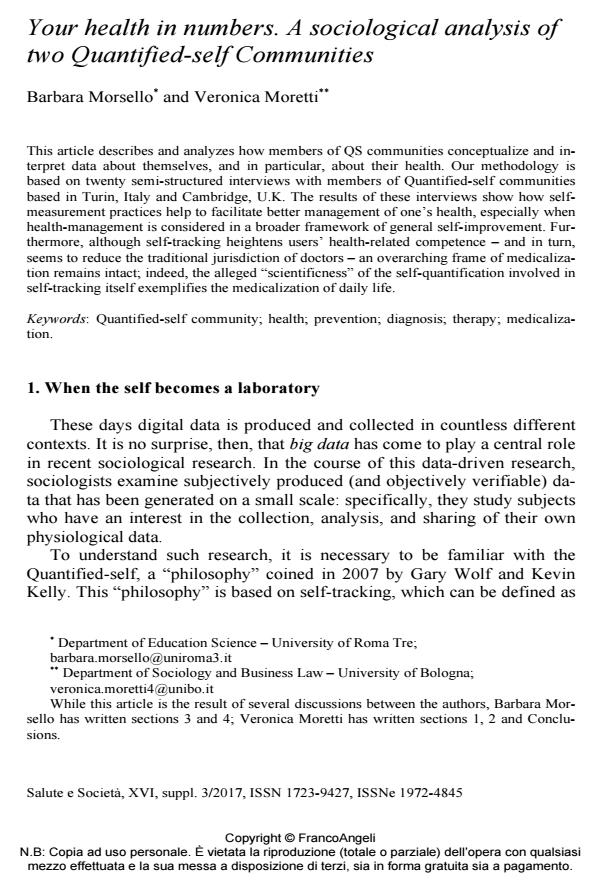Your health in numbers. A sociological analysis of two Quantified-self Communities
Titolo Rivista SALUTE E SOCIETÀ
Autori/Curatori Barbara Morsello, Veronica Moretti
Anno di pubblicazione 2017 Fascicolo 2017/3-Suppl.
Lingua Inglese Numero pagine 14 P. 214-227 Dimensione file 87 KB
DOI 10.3280/SES2017-SU3014
Il DOI è il codice a barre della proprietà intellettuale: per saperne di più
clicca qui
Qui sotto puoi vedere in anteprima la prima pagina di questo articolo.
Se questo articolo ti interessa, lo puoi acquistare (e scaricare in formato pdf) seguendo le facili indicazioni per acquistare il download credit. Acquista Download Credits per scaricare questo Articolo in formato PDF

FrancoAngeli è membro della Publishers International Linking Association, Inc (PILA), associazione indipendente e non profit per facilitare (attraverso i servizi tecnologici implementati da CrossRef.org) l’accesso degli studiosi ai contenuti digitali nelle pubblicazioni professionali e scientifiche.
This article describes and analyzes how members of QS communities conceptualize and in-terpret data about themselves, and in particular, about their health. Our methodology is based on twenty semi-structured interviews with members of Quantified-self communities based in Turin, Italy and Cambridge, U.K. The results of these interviews show how self-measurement practices help to facilitate better management of one’s health, especially when health-management is considered in a broader framework of general self-improvement. Furthermore, although self-tracking heightens users’ health-related competence - and in turn, seems to reduce the traditional jurisdiction of doctors - an overarching frame of medicalization remains intact; indeed, the alleged "scientificness" of the self-quantification involved in self-tracking itself exemplifies the medicalization of daily life.
Parole chiave:Quantified-self community; health; prevention; diagnosis; therapy; medicalization.
- Digital Health and the Gamification of Life: How Apps Can Promote a Positive Medicalization pp.157 (ISBN:978-1-78754-366-9)
Barbara Morsello, Veronica Moretti, Your health in numbers. A sociological analysis of two Quantified-self Communities in "SALUTE E SOCIETÀ" 3-Suppl./2017, pp 214-227, DOI: 10.3280/SES2017-SU3014